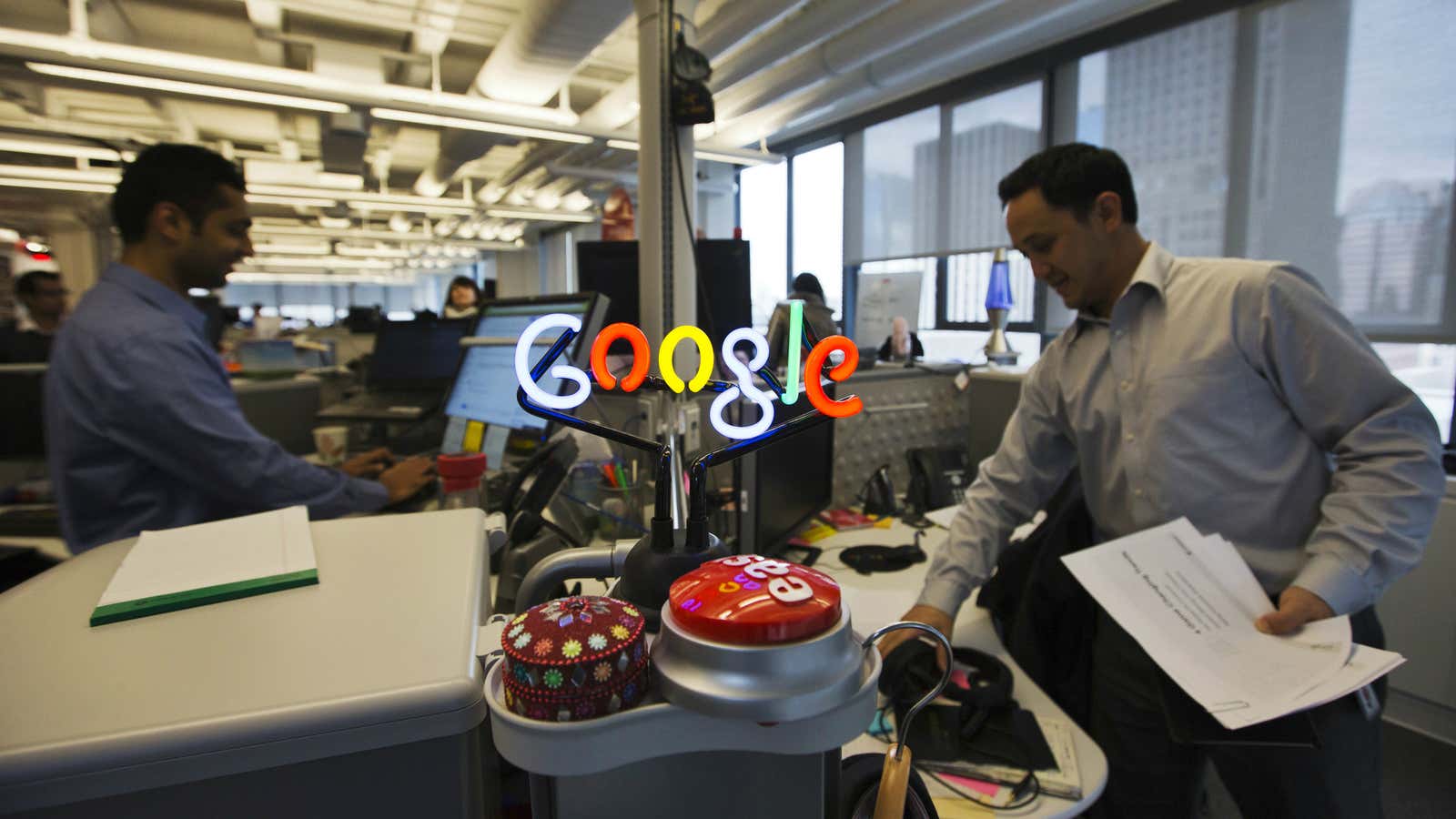The company known as the world’s most attractive employer is being accused of violating employees’ free speech rights by restricting their ability to speak about anything that happens at work, and encouraging them to spy on each other.
A lawsuit filed by an unnamed employee on Dec. 19 accuses Google of violating the California Labor Code with restrictions that hinder employees’ “right to speak, right to work, and right to whistle-blow.”
“Google’s motto is ‘don’t be evil,'” the suit begins. “Google’s illegal confidentiality agreements, policies, and practices fail this test.”
The tech titan called the lawsuit “baseless” and told Quartz, “Transparency is a huge part of our culture. Our employee confidentiality requirements are designed to protect proprietary business information, while not preventing employees from disclosing information about terms and conditions of employment, or workplace concerns.”
The plaintiff, who identifies himself as a product manager at the Mountain View, California company, does not disclose his real name because he says he had been publicly and falsely accused by an investigator at Google of leaking information to the press and terminated.
As “John Doe,” he argues that the information covered by the confidentiality agreements does not just include ”trade secrets, consumer privacy, or any information that should not be disclosed under the law.” Rather, he argues, the tech behemoth is misusing its confidentiality agreements to assert that “everything it does and everything that happens–from the location of a water cooler to serious violations of the law—is ‘confidential.'”
The lawsuit says that the confidentiality agreements discourage workers from raising problems or wrongdoing in the company because of bans on discussing their wages, working conditions, or any nefarious conduct they encounter—even internally.
Referencing a training program titled “You Said What?” the suit alleges that employees are not allowed to put in writing anything about the company’s employees engaging in illegal, negligent, or unlawful activities—to prevent any liability if there is any legal trouble.
And the restrictions don’t end at the office: “The policies even prohibit Googlers from speaking to their spouse or friends about whether they think their boss could do a better job,” the lawsuit claims. Such policies are ”unnecessary and inappropriate,” argues the plaintiff, who is suing seeking compensation for himself and his colleagues under California’s Private Attorneys General Act (PAGA).
The lawsuit also argues that Google violates labor law because the list of things Google employees cannot disclose to a future employer make it difficult for them to get hired: how much money they make, what work they did at Google; their skills, knowledge, acquaintances, and overall experience.
Google even goes as far as prohibiting employees from writing creative fiction, the plaintiff alleges: “Among other things, Google’s Employee Communication Policy prohibits employees from writing ‘a novel about someone working at a tech company in Silicon Valley’ unless Google gives prior approval to both the book idea and the final draft.”
Google reportedly enforces its confidentiality rules through its “Stopleaks” program—an internal website run by the global investigations team, which the plaintiff calls ”a spying program” in the suit. Googlers are encouraged to flag possible “leaks” and file “suspicious activity reports” about their co-workers to their superiors, he claims. The website includes a Chrome extension to facilitate the reporting. A “team of Stopleaks super sleuths investigate every leak,” according to the lawsuit, and their investigations can lead to actions against employees including termination and legal action.
The current suit follows a case filed with the National Labor Relations Board that raised similar allegations about Google censoring its workforce earlier this year. A person familiar with the matter told the Intercept that both the complaint and lawsuit were filed by the same person.
The plaintiff is requesting a jury trial, and is asking for fines on the Silicon Valley company to be paid to all of the 65,000 employees working there during the time period in question—$100 per employee per pay period for the initial violation, and $200 per employee for each subsequent violation. If the employee proves his case, state would get 75% of the penalty, while the rest is split among all its employees, the Guardian reported.
